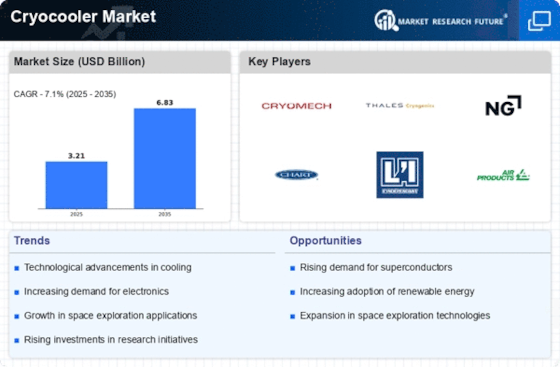Market Trends
Key Emerging Trends in the Cryocooler Market
The Sports Technology market has witnessed a transformative surge in recent years, redefining the landscape of sports and fitness. Advancements in technology have permeated every aspect of the sports industry, leading to several key trends that shape the market. A notable phenomenon is the widespread use of wearables and smart devices in sports. Smartwatches, along with fitness trackers and other wearables are becoming more popular in the professional sports world where athletes improve performance metrics by tracking their goals. They also enhance the training program to become even better. These gadgets produce instant information on parameters such as heart rate, distance covered and calories burnt leading individuals to boost their workouts for better health.
Another major development observed in the sports technology market is the emergence of augmented reality (AR) and virtual reality (VR), which are used for sport training, as well as fan engagement. Integrated with AR and VR technologies, these enable the athletes to recreate in their minds quite complicated scenarios for different games which they can carefully analyze tactics while enhancing strategies of decisions. From the standpoint of fans AR and VR technologies allow them to get closer to actions providing virtual stadium experiences, 360-degree views or interactive content completely changing sports events’ interaction.
One of the major factors contributing to growth in this market is the development in areas like data analytics and sports performance analysis. Data-driven insights are being used by teams and athletes to improve their training methods, preventing injuries, etc. Advanced analytics platforms provide a holistic understanding of player metrics, game statistics, and tactical trends that the coaches and athletes use to arrive at decisions aimed at enhanced performance on the field.
The Sports Technology landscape has incorporated esports and gaming as key elements of its make-up. This spurt in competitive gaming has resulted to more and more investment within the esports infrastructure, streaming avenues as well as video game technologies. Modern esports tournaments draw large audiences around the world and generate fresh prospects for sponsorship, advertising and merchandise sales. This is seen through the convergence of traditional sports and esports as sporting organizations and leagues are present in gaming.
The market trends for Sports Technology are produced through innovations in sports equipment. Sensors embedded in smart equipment like sensor-based basketballs or tennis rackets can provide near real-time information on technique and performance. This practice not only improves the training interaction for athletes but also provides a novel aspect to fan involvement as spectators can obtain data-driven insights during live events.
Sports Technology also boosts progress in sports medicine and injury prevention. Wearables and biomechanical sensors help to monitor athletes’ health issues and detect injury prone risks. However, rehabilitation programs now leverage virtual reality to design stimulating exercises that facilitate the recovery process. These technologies do not only improve athlete wellness but also lengthen their careers by reducing the effect of injuries.


















Leave a Comment